AppIntel AI contains much more than technical papers
More current. More coverage. More detail. More trusted.
 Would it be a ridiculous idea to make yourself stand out in
an industry full of operators winging-it?
Would it be a ridiculous idea to make yourself stand out in
an industry full of operators winging-it?
Rather than wing it, AppIntel AI can make you certainof the technology you are implementing in the field. The upsides, the downsides, the opportunities, and the pit falls.It contains all the detail.
How can you be sure about the technology you employ?
AppIntel AI contains much more technical information than technical papers.
Industry advances are no longer being launched and vetted in peer reviews and conferences. Government submissions now contain the latest technology. You can find it all in AppIntel AI.
These days, new technology is changing the way we operate oil and gas including parallel operations like rubellite and lithium mining. It's all about better and smarter ways to extract and process the great value of the earth.
In this article:
Lithium production scheme
Six ways AppIntel AI is better
Technical paper a drag
Government submission an asset
Vetted by a picky regulator
Current and trusted information
Trusted, trusted sources
AppIntel Ten times more
Best oil field technology
Leading indicators
Avoid mistakes
One operator plans to use regular water flood procedures to produce lithium. He states the lithium reserves for his project. He shows his capital and operating cost estimates and expects to earn a good return for investors.
Think of this as a great primer on lithium extraction.You won't find unless you have AppIntel AI. Get it now from our self-serve portal.
Get details of this cool tech Subscribers get them for freeSix ways AppIntel AI is so much better than technical papers
AppIntel AI is much more complete than industry information in technical papers. It is an artificial intelligence based on industry submissions for government approval.
Because it is based on industry submissions, you can learn much more from AppIntel AI than technical papers.
 Submission
writers discuss many
more subjects than those who write technical papers. Deadlines, sulphur plants, salt caverns, pipeline right of ways, economics, and many other details.
Submission
writers discuss many
more subjects than those who write technical papers. Deadlines, sulphur plants, salt caverns, pipeline right of ways, economics, and many other details.  Industry writers create follow-up
submissions discussing new surprise developments. On the other hand, technical
paper updates never happen.
Industry writers create follow-up
submissions discussing new surprise developments. On the other hand, technical
paper updates never happen. Submissions
air all errors and failures
and their remediation. Technical papers are rarely written on failures. The few failure technical papers omit most of the real nitty gritty of how the failure was caused.
Submissions
air all errors and failures
and their remediation. Technical papers are rarely written on failures. The few failure technical papers omit most of the real nitty gritty of how the failure was caused. Submissions
are always very current – they are written under expensive time urgency. Technical
papers are written if the writer gets around to it as a low priority.
Submissions
are always very current – they are written under expensive time urgency. Technical
papers are written if the writer gets around to it as a low priority. Submissions contain much more detail than
technical papers. More time and expense is taken writing submissions. Sometimes the submissions in AppIntel AI include over 200
pages. Technical papers rarely top five pages.
Submissions contain much more detail than
technical papers. More time and expense is taken writing submissions. Sometimes the submissions in AppIntel AI include over 200
pages. Technical papers rarely top five pages. Submissions
must be bomb-proof. No detail can be skipped. They must convince a picky
regulator. They have the power to refuse approval and use it often.
Submissions
must be bomb-proof. No detail can be skipped. They must convince a picky
regulator. They have the power to refuse approval and use it often.
All the advantages of industry submissions to government exists in AppIntel AI.
Writing a technical paper is a drag
 When an industry technical author writes a paper her space
is limited. Writing is exhausting. He writes the bare minimum. Her
only compensation is recognition and a sense of accomplishment.
When an industry technical author writes a paper her space
is limited. Writing is exhausting. He writes the bare minimum. Her
only compensation is recognition and a sense of accomplishment.
Many more papers are started by professionals than are submitted. His boss discourages the task. Her supervisor limits the time that can be spent on the paper. His manager insists on editing out the most helpful information to protect competitive advantage. They see writing a technical paper as a liability.

Writing a government submission is an asset
 On the other hand, when an oil and gas professional writes a
submission to the government asking for permission to conduct an operation, its
success is truly part of her compensation. His job productivity is judged
by the approval of the submission.
On the other hand, when an oil and gas professional writes a
submission to the government asking for permission to conduct an operation, its
success is truly part of her compensation. His job productivity is judged
by the approval of the submission.
His boss follows up every day asking if the submission is complete and approved. Her supervisor encourages collaboration with others to ensure the best approval outcome. He hires consultants to write inclusions to make sure everything is convincing and correct. Her manager encourages complete disclosure. They see writing a submission as an asset.
More submissions are written than technical papers. Submissions include more information and take more effort.
Technology vetted by a picky regulator
The picky regulator requires all the detail. They adjudicate the submission with a careful eye to understand the technical merits of the entire operation. They challenge issue, every pressure. They have the power to refuse approval and use it often.
On the other hand, technical papers are vetted by industry volunteers that have no stake in getting to the truth other than their altruistic industry interest. They don't challenge with back-and-forth dialog. They don't have any power to cancel the technical paper effort.
Oil and gas AI data sources must be both up-to-date and highly reliable.
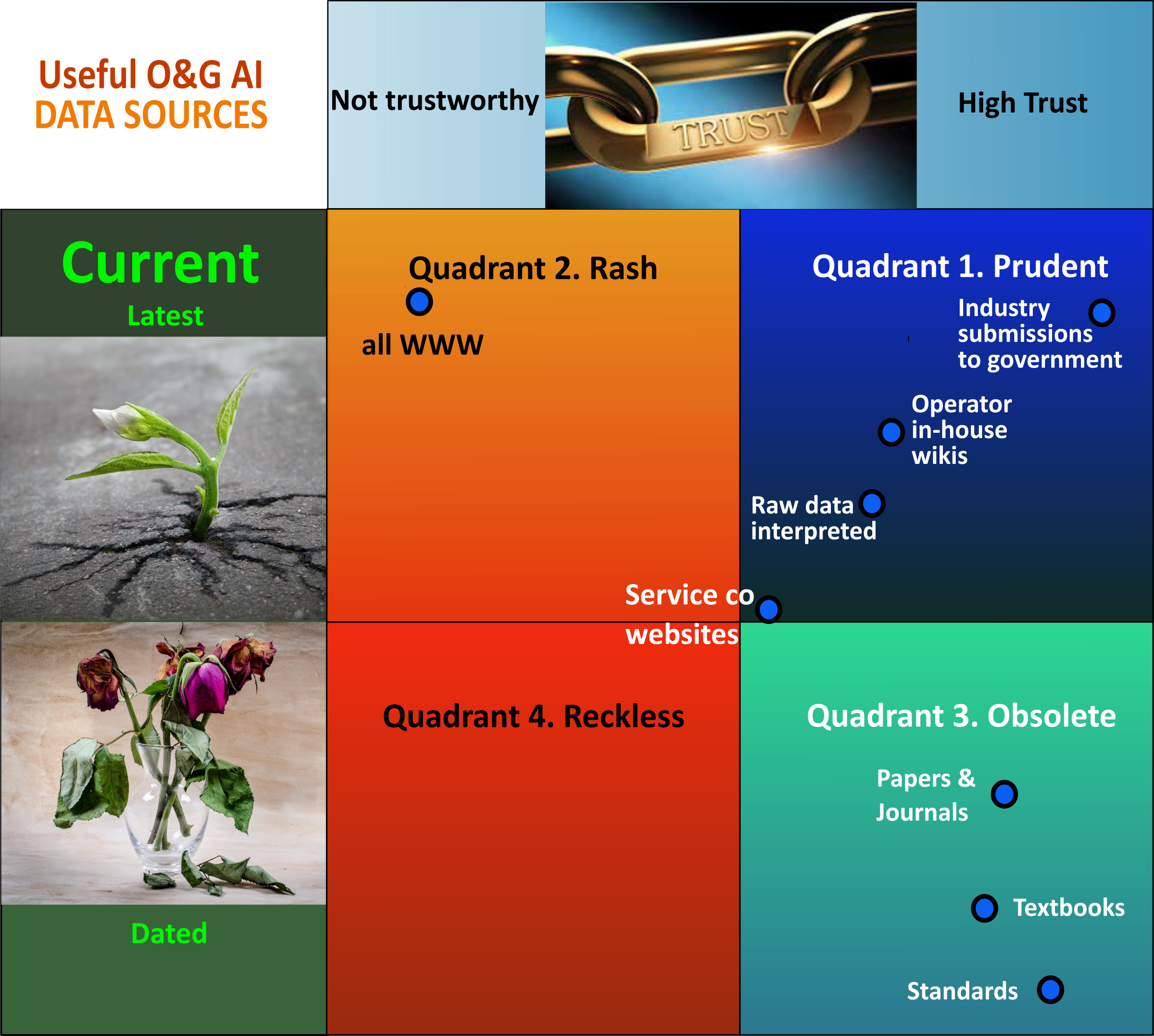 In this rapidly changing sector, having reliable and current
data is absolutely
critical. Old standards are being replaced by new tech all the time, so if
you want your AI tools to actually help, you need the latest information.
In this rapidly changing sector, having reliable and current
data is absolutely
critical. Old standards are being replaced by new tech all the time, so if
you want your AI tools to actually help, you need the latest information.
Prudent oil and gas operators use information sources in Quadrant 1 of the Trust-Current matrix.
Now, here's where AppIntel AI stands out: it taps into the best oil and gas info out there — industry submissions to government. These are available, well-organized, and thoroughly documented. You can trust them – they're always up to date. That's why AppIntel AI is considered the gold standard for anyone working in oil and gas.
Operator in-house wikis — when they actually exist — can be fantastic info hubs, but they're often a bit patchy when it comes to documentation. In the oil and gas world, folks usually spend more time executing projects than updating documents. Plus, these internal wikis are kept under tight wraps. Operators don't want to give away industry secrets, so they rarely share this stuff outside their own teams.
Trusted, trusted sources
 But it’s not just about being up to date — you also need to
trust your sources. Relying on dodgy or outdated info can be downright
dangerous and put safety at risk.
But it’s not just about being up to date — you also need to
trust your sources. Relying on dodgy or outdated info can be downright
dangerous and put safety at risk.
Using information from Quadrant 2 of the Trust-Current matrix is rash. These sources can be very current, but are not trusted by the oil and gas community.
For example, using unverified data from open web platforms like ChatGPT, Gemini, or CoPilot isn't a safe bet for oil and gas intelligence. These are the kinds of sources you want to avoid.
Unfortunately a search engine and its associated AI are only as good as its input. Google, ChatGPT, Gemini, and CoPilot are trained on the disinformation on the world wide web including:
- Frack-fear as well as frack technology;
- Energy doomsday prognostications as well as real reserve forecasts;
- Poorly informed opinions as well as expert opinions.
Using only sources from Quadrant 3 of the Trust-Current matrix provides only obsolete information. Super-reliable sources like textbooks and technical papers can be very outdated, which doesn't help much in a fast-moving industry.
Fresh data for the new plays doesn’t reside in textbooks and standards even though these sources are very trustworthy. Textbooks take years to produce; Standards take decades.
The sweet spot? Info that's both trustworthy and current (quadrant 1 in the trust-currency matrix). Service company websites can be helpful, but keep in mind that they might only promote their own products and the data can be hit or miss when it comes to recency.

Raw data created for the industry is usually right up to the minute, but you might have to dig for it — and analyzing that data can take a lot of time.
AppIntel AI uses reliable, government-submitted oil and gas data that is organized, well-documented, and current. Its accuracy and accessibility make it a top choice for oil and gas professionals.
Ten times more than SPE
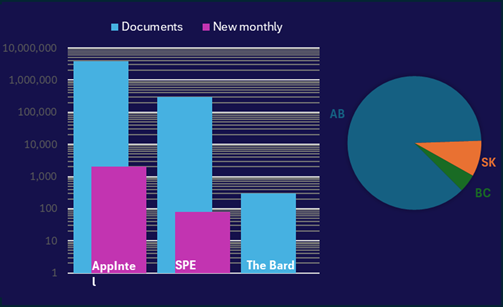 AppIntel AI has more documents
than SPE papers — 10 times more. It has ten thousand times the number of documents written by Shakespeare.
AppIntel AI has more documents
than SPE papers — 10 times more. It has ten thousand times the number of documents written by Shakespeare.
About 700 documents are added to AppIntel every day. On average an industry submission document is added to AppIntel every six minutes.
AppIntel is an LLM (Large Language Model) containing over 3.7 million documents. It is trained to allow quick search seventeen ways.
AppIntel AI acquires this search ability using a careful semi-supervised machine learning process developed over 15 years.
AppIntel is a made-for-purpose oil and gas artificial intelligence application focused on improving oil production and reducing costs.
Advances fill the pages of AppIntel output. Unlike technical papers, all the AppIntel AI advances are ground truthed to a physical well location.
AppIntel AI is much more complete than technical papers.
AppIntel AI is the best way to stay on top of oil field technology
 You can get new submissions within 20 miles of
your operation delivered to your inbox the morning after they are
submitted. AppIntel AI does that.
You can get new submissions within 20 miles of
your operation delivered to your inbox the morning after they are
submitted. AppIntel AI does that.
The technical information contained in submission documents are a diary of real field implementation. AppIntel AI delivers those to your email inbox fresh as this morning.
AppIntel AI information is the most current you will find anywhere. A year fresher than technical papers. Years more current than university classes. A decade more current than textbooks. AppIntel AI is the only way to watch industry trends in real time.
Technical papers and conferences are years behind the leading edge. Operators are innovating all the time.
You can study all the technical papers on lithium extraction. You can read every bit of sales literature on the subject. But you'll never learn more than by reviewing actual lithium field implementations from AppIntel AI.
AppIntel AI sends you leading indicators
How can you be ready for anything? You need to be watching what other operators are doing. Industry submissions are leading indicators of future industry activity.
They broadcast the pessimism (or optimism) of an operator. They indicate the operator's short and long term plans.
AppIntel AI is an exposé of practical technology use. It shows how technology works out in the field. It indicates success and failure of each type of technology. It even offers ways to conduct look-back analysis on technology installations.
Even the submission documents upon which AppIntel AI is trained are leading indicators: An application is argued and decided before any action happens in the field. Advances fill the pages of regulatory applications every day. Unlike SPE papers, all the AppIntel AI advances are ground truthed to a physical location.
AppIntel AI helps you avoid others' mistakes
 When existing operations have a problem, the
operator reports it to the regulator in a submission with their proposed
corrective course of action. AppIntel AI delivers these to your inbox
automatically.
When existing operations have a problem, the
operator reports it to the regulator in a submission with their proposed
corrective course of action. AppIntel AI delivers these to your inbox
automatically.
If you don't have AppIntel AI, how can you anticipate the problems that come along with trying a new technology?
Which source of technical information would you trust: technical papers or industry information from AppIntel AI?
Tags: Flood, Exploration, AppIntel advantage, Facilities, AI in oil and gas
 Granger Low Updated 30 Jan 2026
Granger Low Updated 30 Jan 2026
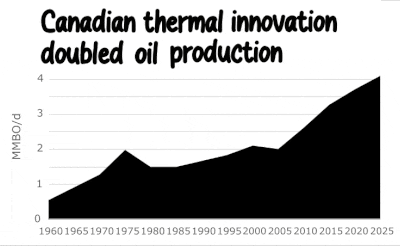
Experimental Propane Solvent co-injection in thermal
Continuing Canadian thermal innovation doubled oil production

Measuring the rate of oil and gas technology growth
Energy transition inside the oil industry
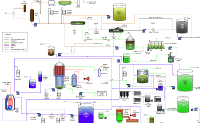
The rise of water recycle
Join or perish

AppIntel AI hit alerts
Ignite your insight

Blowdown and NCG injection
SIRs often reveal more than submissions

New flood to double reserves for heavy oil pool
The age of water floods is not over

Flood repatterning
Extended life support

AI makes opportunity more accessible than conferences
Which sources of technical information do you trust?

Repairing microannulus in thermal wells
Check out the 4D seismic chamber thickness map

In-house AI attempts fail-80%
Spin off your in-house AI attempt

Facility fugitive emissions scrutiny
Keep your eye on the horizon of oil and gas change

AI predicts the future for 2026
using leading indicators

Celebrating 2025, a year of innovation
Oil and gas paradigm shifts this year

RTF: Most refused submission type in November
Leading indicators from industry

Astrobleme impacts deep well disposal scheme
Learn from the experience of other operators

Non-meridian thermal wells
Still drilling horizontal wells N‑S? Why?

Steam surfactant co-injection
Want to win? What is your competitive advantage?

Surprise! Sour gas production from a sweet thermal scheme
Dealing with surprises in the oil and gas industry. What to do next.

10 ways to increase production before Christmas - Infographic
For your wall to remind you

10 ways to increase production before Christmas
Each cost less than half a million

Using AI to reduce risk of oil and gas failure
How can you assess the risk without knowing the epic fails?

Artificial intelligence using vetted oil and gas information
Using anything else is dangerous

Your AI search history is being sold to your competitors
Your use of AI is not free

Smarter acquisitions
Video demo on using the KiP box for acquisitions

AI alerts increase the speed of innovation
AI launches oil and gas operators from rival wins

Elusive promise of ASP flooding
This one's ending
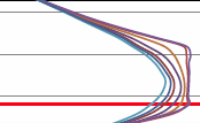
SAGD Blowdown Experiment
Shows his unexpected results

Selfie-mail: emails to myself
I send more emails to myself than to any other person.

Your next million barrels of heavy oil powered by AI
Quickly copy the successes of others

Shared: powerful side by side comparison of before and after polymer flood
Six fold oil production increase

Four ways your flood is crying for help
Can you hear it?

Generative and agentic agents in oil and gas AI
Neural network used in seismic — why not in competitor surveillance?

AppIntel AI blog delivering over 50,000 pages views per month
Artificial Intelligence for the oil and gas industry

The making of an oil and gas AI.
Decoding the building blocks of Artificial Intelligence

Success is in the pattern not just the polymer
A preferred pattern is very important





 Calgary, Alberta, Canada
Calgary, Alberta, Canada
 Share
Share